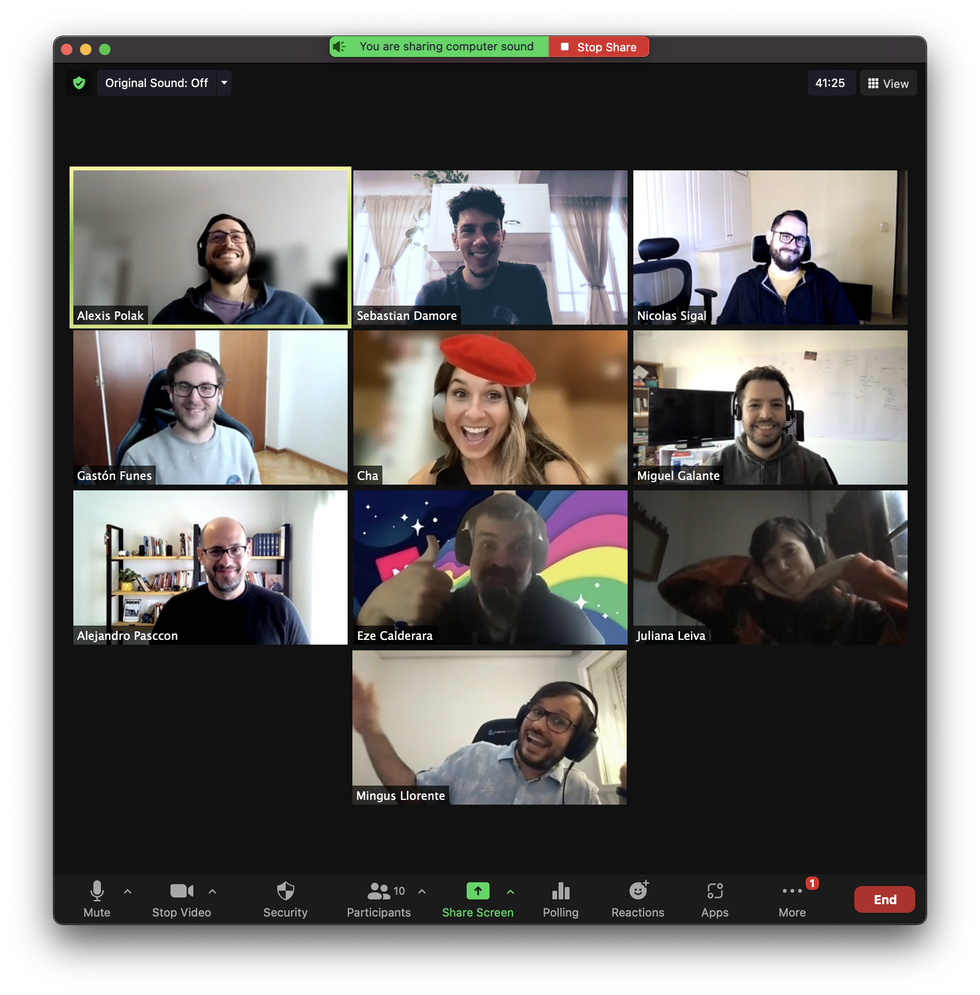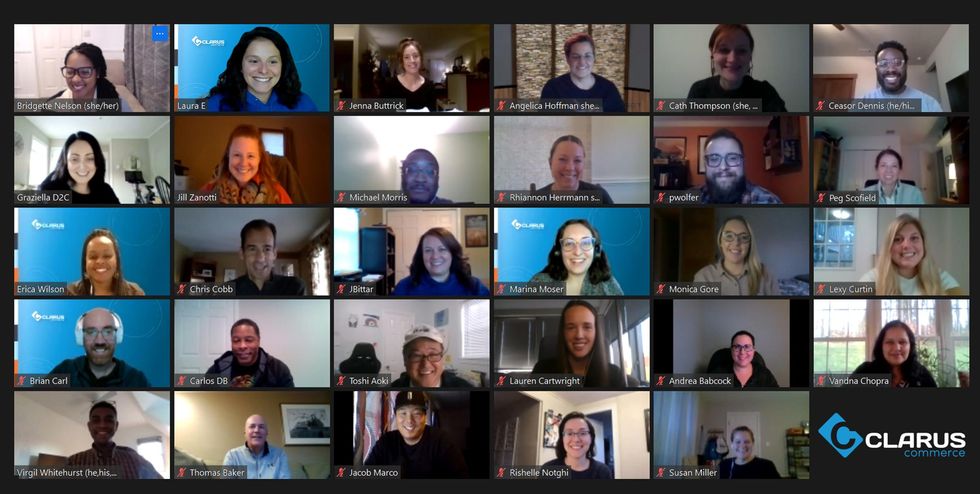You're perfectly qualified, you've arrived on time, and you're ready for your technical interview. What could possibly go wrong?
Technical interviews can be a mind wracking experience for job seekers. Everyone makes mistakes, but according to interviewers, candidates for tech positions are prone to a number of common interview blunders. To avoid them, it's helpful to know what they are.
Keep reading to see what our partner companies had to say about the most common mistakes interviewees make during tech interviews (and what to do instead).
Not asking clarifying questions - Facebook
"The mistake: Not asking clarifying questions.
What to do instead: Instead of jumping into coding immediately after being presented with a problem, ask clarifying questions to ensure you've understood the problem correctly before you begin building a solution. For example, you may want to understand input requirements or ask about edge cases. When you do begin to code, think out loud as you go—and keep asking questions. Hearing your thought process helps give your interviewer insight into your problem-solving skills and can provide opportunities for them to offer additional points of clarification or share hints, if needed."
Learn more about Facebook here.
Making assumptions without calling them out - Uber
"Making assumptions without calling them out and jumping into a solution without asking questions or calling out your approach. It's important to take things slow and help us really understand how you think through problems. So make sure that you really understand the question that's being asked by your interviewer. That you ask clarifying questions. And that call out your approach."
Learn more about Uber here.
Not explaining your thought process - Def Method
"For me, the most frustrating thing an interviewee can do is not explain their thought process to me. As an interviewer I want to see how someone approaches problems in general so I can decide how successful they will be at solving different problems. When I ask a question and get an answer without hearing how the interviewee arrived at it, I cannot extrapolate on their problem-solving abilities. An interviewee should show me their thought process—explain their thinking so I can decide how well they will be able to apply those skills as an employee."
Learn more about Def Method here.
Not saying "I don't know" - Clyde
"A common mistake that we see is candidates not knowing an answer to a question and making up fake technical answers, spitballing at length, or just remaining quiet. It's much better for you to say "I don't know" and talk through the process that you would use to figure out the answer. A part of the interview is understanding how someone works through a problem they haven't seen before, if you have a good process for figuring the answer out, that's often enough to pass. Even if you know the answer, talk us through your process!"
–Josh and Josh
Learn more about Clyde here.
Not explaining how you got to your answer - Automattic
"Being so focused on the answer that they don't explain how they got there. Explaining their thought process in detail helps us determine how they approach problems. As a result, it's important to "think out loud," and ask for more context if needed. The problems we solve at Automattic are so varied and unique that we care less about someone's answer to a specific question, and more about how they approach it. Knowing that lets us evaluate if their problem-solving process is robust enough for us to feel confident that they could solve anything that comes their way."
–Jerry Jones, Hiring Expert
Learn more about Automattic here.
Not asking clarifying questions from go - Kensho
"One of the simplest mistakes you can make during a technical interview is to not ask clarifying questions early or check in regularly. Remember that the interviewer wants you to succeed, but cannot read your mind. If you don't understand the question, become stuck, or feel like you may be veering off course, it's time to check in! Explaining your thought process opens a dialogue between yourself and the interviewer, and you may even discover the solution just by saying what you're thinking (see "rubber duck debugging")."
Learn more about Kensho here.
Not discussing your specific contributions - LogMeIn
"Developing software at scale requires a team effort. Throughout each step of the SDLC, each team member provides individual contributions of various scope and complexity. From Planning, Analysis and Design to Implementation, Testing/Integration and Maintenance, each individual contribution is important to overall outcomes. Too often, candidates answer interview questions in terms of the team's contributions, (e.g., "we did X"). Oftentimes, post-interview feedback cites a candidate's answers being too general or vague. This leads to skepticism. I advise candidates prepare to discuss their specific contributions within the context of overall outcomes, (Incl., SDLC steps, role within team, deliverables, impacts, lessons-learned, etc.)."
–Ryan Jane, Principal Talent Acquisition Partner
Learn more about LogMeIn here.
Not doing your homework on the company - Waters
"In our industry, we're used to seeing a multitude of acronyms and initialisms used in an interview. To demonstrate your knowledge and experience it's always best to talk through a brief summary – that can be very impactful.
Even though we are interviewing people for their technical capabilities, we still want to see that they are prepared and know about the company. As tempting as it may be to read the website whilst on a virtual interview, being prepared in advance and able to describe in your own words gives a much better impression of your research and interest."
Learn more about Waters here.
Miscommunication - Afterpay
"I think one of the most inhibiting mistakes interviewees make is miscommunication. Even though for the one hour we are sitting at different sides of the table, I see you as my potential future teammate. I'm not here to judge but to understand your thinking process and work out a solution together. Asking questions when you are in doubt and letting the interviewer know your thoughts and concerns is very important. Having different opinions with an open mind to suggestions is totally fine. "
–Greta Shi, Senior Software Engineer
Learn more about Afterpay here.
Not clearly stating which programming language you're comfortable with live coding in - Mural

"Not showing up to the interview is always #1
#2 is related to candidates not making clear which programming language they are comfortable with for live coding during the interview.
And finally, #3. Candidates not making sure they have a suitable environment (laptop with camera, text editor, tools, etc) for the interview.
So remember to show up on time, be honest with your interviewer and test your environment before joining!"
Learn more about Mural here.
Being unprepared to discuss examples of your technical expertise - Bristol Myers Squibb
"One of the most frustrating mistake that interviewee's make is that they do not come prepared to explain their technical experience/ projects with examples.
Interviewees must come prepared with the following:
- Thoroughly read the job description.
- Be prepared to explain your experience as it relates to the job.
- Always share examples.
- Explain and share details of your experience on an application.
- Communicate effectively, be explicit and to the point (articulate).
- Do not be afraid or shy away from accepting, if you do not know the answer. (no one knows it all)
- Read about the company to understand cultural fit, display skills including how you do Time Management, Organizational skills, Trouble-shooting approach, and Interpersonal skills.
- Come prepared to ask questions."
–Poonam Pednekar
Learn more about Bristol Myers Squibb here.
Not tailoring your experience to the role you're applying to - Clarus Commerce

"The biggest mistake all interviewees make is not tailoring their experiences to the job they're applying to. My advice for your interview prep is to rely on the job description. Go line by line and jot down the experiences you have that align with what the job description is asking for. Make it obvious for the interviewer why you'd be best for the position. Be sure to share your experience using the Company's tech stack with examples as the 'proof behind your responses'. Be prepared, be excited, and ask questions!"
Learn more about Clarus Commerce here.
Answering a question you don't fully understand - Collins Aerospace
"One of the biggest opportunities for mistakes comes from trying to answer a question you don't fully understand. Don't assume– ask clarifying questions so you know what's expected. Also, be concise so there will be time for follow-up questions and conversation."
Learn more about Collins Aerospacehere.
Not taking a collaborative approach - Netskope
"Certain technical interviews are structured to intentionally be open-ended to invite questions and a deeper discussion between interviewer and candidate. Although candidates have the right background, some may not be used to collaborating in solution design and explaining their thought processes, thus leading to a roadblock. Without the explanation of a thought process, it's difficult for the interviewer to guide the candidate and evaluate their analytical skills and strengths.
Instead, candidates should take a collaborative approach and seek feedback as they work toward a solution. Selecting a challenging problem and solving it with a friend by thinking aloud and collaborating could be useful practice in preparation for the interview"
–Mohan Doraiswamy, Sr. Manager, Engineering
Learn more about Netskope here.
Rushing into problem-solving mode - SeatGeek
"One of the frustrating mistakes I see candidates make during technical interviews is when they dive into solving the prompt without taking some time to size up and digest the question. Oftentimes, a candidate's first instinct is not the most optimal, which poses more of a challenge when they must backtrack, and ask retrospective questions to change their solution.
My best advice here is to first pause, review your resources, and ask clarifying questions before you start writing code. The way you think through a problem and work towards a solution can be just as important as the solution itself!"
–Josh Mordkoff, Senior Technical Recruiter
Learn more about SeatGeek here.
Not articulating your thought process - MongoDB
"During a technical interview, focus on verbally communicating your thought process. This could show that you approach a problem in a new and unique way. At MongoDB, we highly value diversity of thought, different backgrounds and sets of experiences, as well as different perspectives on how to approach solving problems. Adding another perspective to solving the questions we face will only help us build better products for our customers."
–Jason Gorsky, Manager, Technical Recruiting
Learn more about MongoDB here.
Not testing out equipment ahead of time - GameChanger
"One of the more frustrating mistakes interviewees make during technical interviews is not testing out equipment ahead of time. As more companies move to remote work, most, if not all, interviews are taking place over tools like Zoom, Google Meet, or Microsoft Teams. Making sure ahead of time that your computer is able to run these applications without technical issues goes a long way in showing us that you're prepared. The last thing an interviewer wants is to spend the first 15 minutes dealing with technical difficulties because now it delays getting to know you more."
Learn more about GameChanger here.
Not providing applicable examples - CAPCO
"Tips to Bring into an Interview:
Carly Finnegan, Technical Recruiters says:
- Do research on the company where you're interviewing and come prepared with at least 2 questions
- Be able to explain, or give an example of, a project that you were on, the importance of the project and how you worked with other members of your team (i.e. developers, QA, Scrum Masters, Tech BA's, etc.)
Craig Jackson, Tech Recruiter says:
- Be able to articulate technical experience and provide an applicable example of when and how tech was used
- Be able to articulate what your individual contribution has been (not TEAM's contributions)
Matt Markham, Partner in the Technology Domain
- Demonstrate awareness of HOW things are meant to work instead of merely providing the code / answer
- Show problem solving ability
Ken Pritchard, Principal Consultant, Technology
- A big mistake many technical interviewees make is trying to dive right into a solution when given a technical problem to solve. Taking the time to ask some clarifying questions not only leads to a better solution, but also more clearly demonstrates higher level thinking."
Learn more about CAPCO here.
Overexplaining responses - Autodesk
"Avoid overexplaining your responses. Keeping your answers clear and concise will show that you have a strong understanding of what you're describing. Try to remember that if your recruiter wants more detail, they will ask for it. Next, avoid exaggerating your skillset. Recruiters would much rather take a chance on a candidate who is willing to learn than one who can't demonstrate a skill they claimed to have. Finally, be able to explain your thought process behind any decisions you have had to make. Doing this, even in failure, can show how you learn and adapt."
Learn more about Autodesk here.
Developing a solution without communicating your thought process - Guru
"In technical pair programming interviews, the biggest frustration I have is candidates developing their solution without communicating their thought process. Regardless of whether the code works or not, this makes it more challenging to gauge the candidate's technical aptitude, problem-solving skills, and reception to feedback. Instead, I suggest interviewees think out loud as much as possible. Consider rereading the problem statement and validating the requirements, asking clarifying questions, vocalizing potential approaches, explaining tradeoffs while coding, and sharing ideas on optimization. This may not come naturally at first, but practice makes perfect!"
–Maggie Lin, Back End Software Engineer
Learn more about Guru here.
Giving answers that are too short - PagerDuty
"Sometimes candidates make the mistake of giving one or two word answers to questions in the recruiter screen. That makes it tough to make a case to the hiring manager about why they would want to hire you.
Successful candidates prepare. Learn about the company and the role. Ask about the interview process and what you should expect. Communicate why you would want to work here.
Remember, an interview is a conversation! As a recruiter, I love when candidates display enthusiasm about PagerDuty and have researched it."
–Dick Hartshorne, Lead Recruiting Business Partner
Learn more about PagerDuty here.
Responding without thinking - Healthfirst
"One of the biggest mistakes interviewees make is not answering the question. They try to respond immediately without taking the time to tell their story in a succinct way. This can lead to a few things: a rambling, long-winded answer; a confused recruiter; and/ or an unanswered question.
Instead, take a deep breath, gather your thoughts, and answer using the STAR (Situation – Task – Action – Result) method. Describe the situation, explain the task you had to complete, describe the action(s) you took to complete the task, and describe the results of your efforts."
Learn more about Healthfirst here.
Not voicing your thought process - BlackRock

"No one knows everything, so you don't have to act like it. Interviewees should be genuine and honest. That means voicing your thought process, even if you're still coming up with a better solution.
As a technologist at BlackRock, the challenges you'll tackle will be complex and the impact you'll have will be vast – you'll help move markets, build economies and support the retirement of millions of people around the globe. To best serve our clients, we need people with diverse perspectives, talents and ways of thinking.
That's why demonstrating what you know and how you think is way more important than the "right" answer."
Learn more about BlackRock here.
Trying to bluff your way through the interview - Elastic
"The psychology around not saying "I don't know" is that we as humans don't like to say that about anything, ever. It shows weakness. But it can take strength to demonstrate weakness, and such an admission is often viewed in a positive light. I don't think most candidates realize this though, and try to bluff their way through instead. This typically leads to long-winded answers that go nowhere. On those occasions when candidates ask for advice, I try to coach them to not be afraid to own up to when they don't know something."
–Tucker Wolfe, Recruiter
Learn more about Elastic here.
Not asking for pre-interview guidance - Procore
"There are three frequent mistakes that many candidates make during their technical coding interviews.
First, candidates generally jump straight into coding before understanding the problem holistically. Similar to how we build products at Procore, coding challenges are designed to build from one section to the next, so it's important to understand the entire problem as presented, not just the first section. We see candidates lose valuable time as they progress through a challenge if they have to continually go back and rewrite code to make future sections work.
Secondly, candidates tend to be more 'heads down' while coding. Communication is key during a coding challenge—this will allow an interviewer to understand a candidate's thought process to help steer them in the right direction if needed. Procore is a highly collaborative environment where teams across the company work together to design and develop best-in-class software solutions successfully. Open lines of communication are both appreciated and required for success within our Product & Technology organization.
Lastly, and the most important—ask your recruiter for pre-interview guidance to help prepare for the interview! We are your biggest ally internally and want to ensure you're prepped with resources, tips, and insights that empower you to have a confident and successful interview."
–Garrett Wilson, Staff Technical Recruiter
Learn more about Procore here.
Not clarifying your thoughts before analyzing your code - VTS
"At VTS, we focus on pair programming for technical challenges and the number one mistake we see is candidates not sharing their thought process. Not only do we want to see how interviewees collaborate with members of our team, but it makes it difficult for the interviewers to help remove blockers or make suggestions when they don't know where or why you are getting stuck. Also, ask questions! The earlier you clarify your thoughts, the easier it is to plan and analyze your code."
Learn more about VTS here.
Not preparing for behavioral interview questions - Unstoppable Domains
"One frustrating mistake that many interviewees make is not preparing for behavioral interview questions and not clearly or concisely communicating the depth of their technical experience. Almost all companies ask behavioral questions, but many candidates feel blindsided by these. Before the interview, we recommend reflecting on your biggest achievements and areas of opportunity over the last 5 years, then rehearsing answers in the STAR format - Situation, Task, Action, and Result. Be specific. Why were those achievements important? What was the measurable impact? What did you learn as a result? It's not just about knowing the programming language, it's about being able to discuss real-life situations and how you were able to problem solve, collaborate, and add value. Bonus points if you research the company mission, values and tech stack beforehand so that you can tailor your response to each company."
Learn more about Unstoppable Domains here.
Not familiarizing yourself with the product - Smartsheet
"Many interviewees don't take the time to familiarize themselves with the Smartsheet product before their interview. Aside from reflecting poorly on their interest in our company, it makes it harder for them to understand where technical questions are coming from and then answer appropriately. Establishing even a basic understanding of our product gives candidates valuable context when thinking through responses to our questions (and asking meaningful questions of their own!). Our website is a great first stop, or candidates can even sign up for a free trial account to try out the product for themselves."
Learn more about Smartsheet here.
Weak communication - Veracode
"One of the most common mistakes interviewees make during a technical interview is having long-winded answers which can take time away from additional questions the interviewer may have. If you recognize this in yourself, practice breathing between sentences, or jot down some key points you want to share to reference during the interview. Strong communication begins with being an active listener then giving an answer that is clearly articulated, confident, and shows empathy. If you worry about being not detailed enough, remember the interview can always ask you to elaborate further. Demonstrating these communication skills during an interview will put your candidacy on the top of the list, as technical hiring managers are always seeking strong communicators on their teams."
Learn more about Veracode here.
What Diverse Talent Wants in 2024
5 Tips to Optimize Your Remote Job Search
- Not asking clarifying questions - Facebook
- Making assumptions without calling them out - Uber
- Not explaining your thought process - Def Method
- Not saying "I don't know" - Clyde
- Not explaining how you got to your answer - Automattic
- Not asking clarifying questions from go - Kensho
- Not discussing your specific contributions - LogMeIn
- Not doing your homework on the company - Waters
- Miscommunication - Afterpay
- Not clearly stating which programming language you're comfortable with live coding in - Mural
- Being unprepared to discuss examples of your technical expertise - Bristol Myers Squibb
- Not tailoring your experience to the role you're applying to - Clarus Commerce
- Answering a question you don't fully understand - Collins Aerospace
- Not taking a collaborative approach - Netskope
- Rushing into problem-solving mode - SeatGeek
- Not articulating your thought process - MongoDB
- Not testing out equipment ahead of time - GameChanger
- Not providing applicable examples - CAPCO
- Overexplaining responses - Autodesk
- Developing a solution without communicating your thought process - Guru
- Giving answers that are too short - PagerDuty
- Responding without thinking - Healthfirst
- Not voicing your thought process - BlackRock
- Trying to bluff your way through the interview - Elastic
- Not asking for pre-interview guidance - Procore
- Not clarifying your thoughts before analyzing your code - VTS
- Not preparing for behavioral interview questions - Unstoppable Domains
- Not familiarizing yourself with the product - Smartsheet
- Weak communication - Veracode



